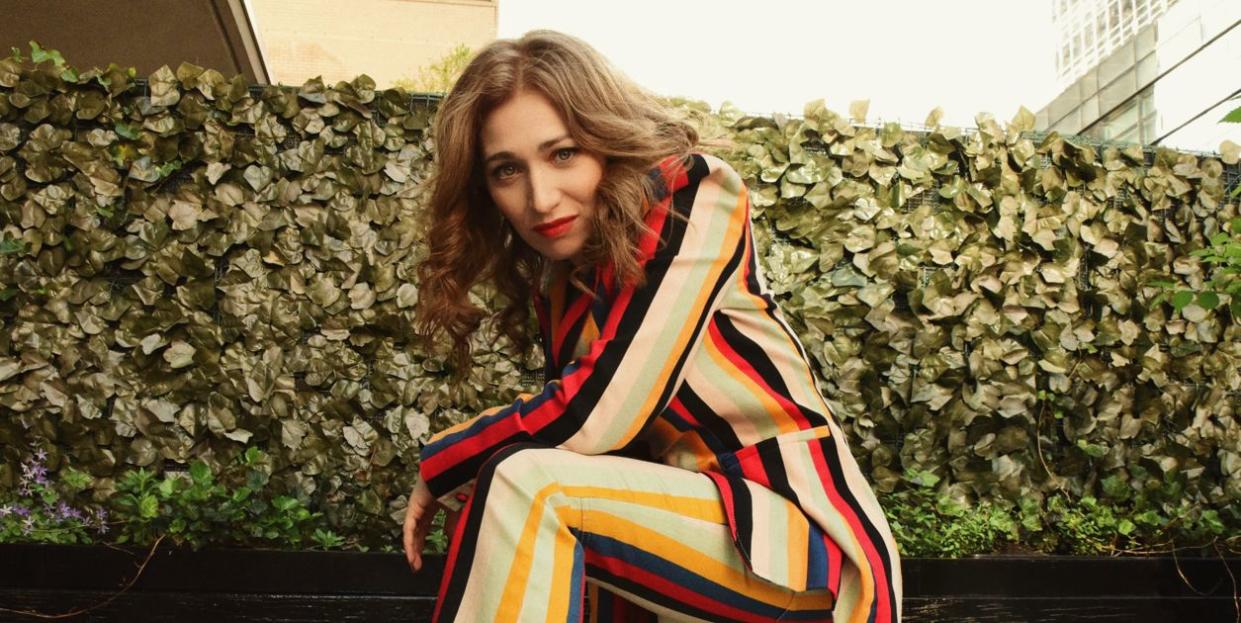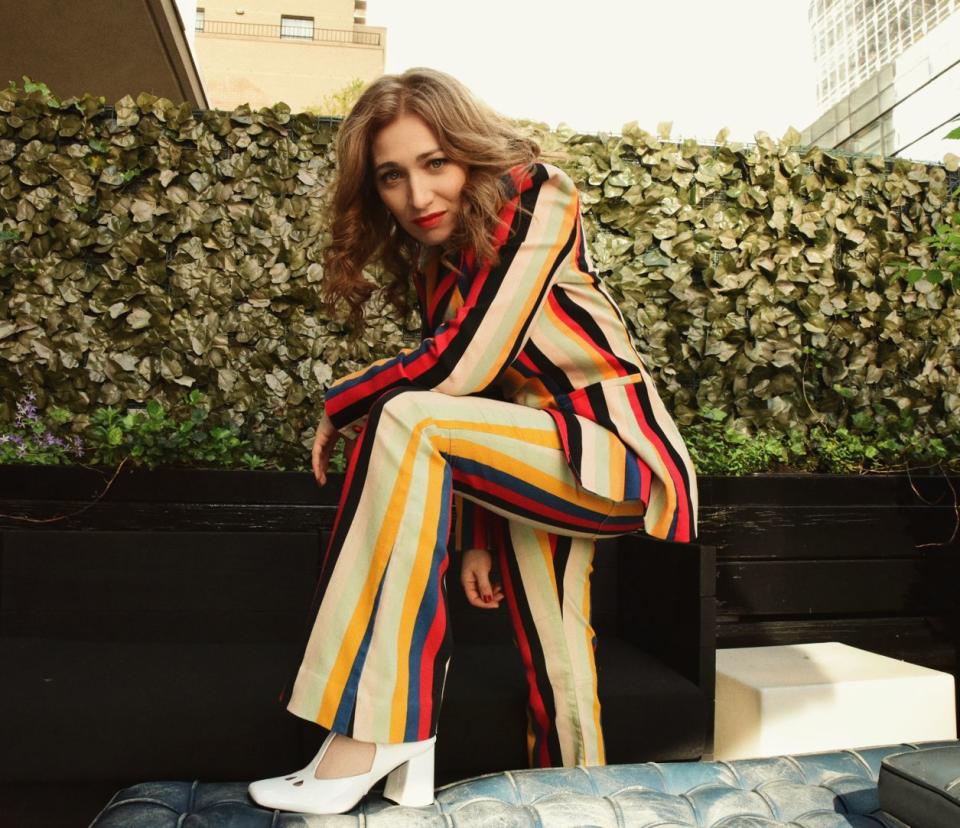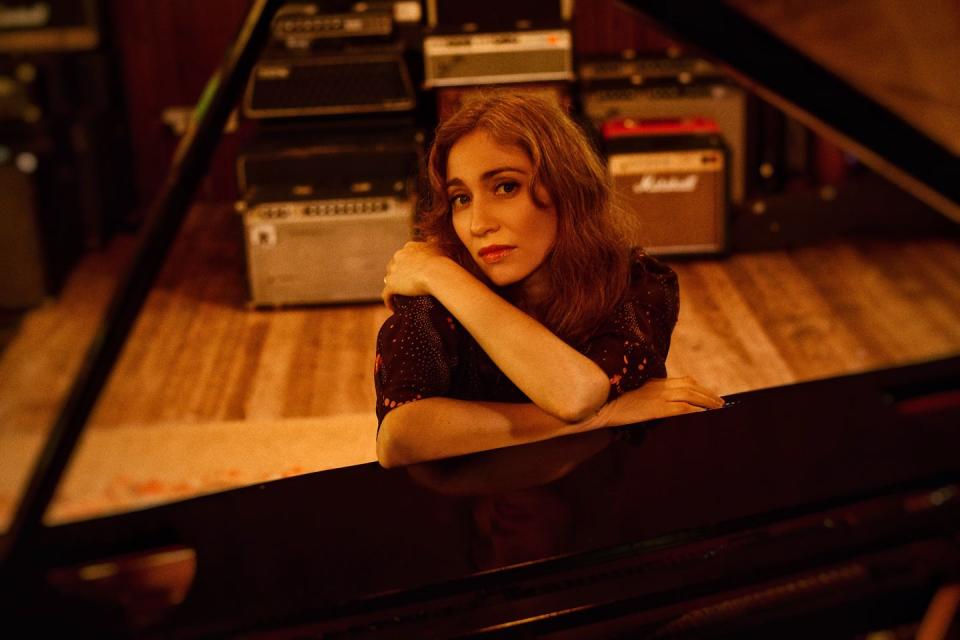Regina Spektor Pledges Allegiance To The Song

- Oops!Something went wrong.Please try again later.

“You know how there's heat-seeking missiles?,” says Regina Spektor. “I'm like a new-experience-seeking missile. I get very excited to work in a new way or work with new people. New things get born of it. The whole color-by-numbers thing is a huge fear of mine. It's not how I want to make art.”
Still, the process of making her eighth studio album, Home, Before and After, was maybe a little more than the Russian-born, Bronx-raised singer/songwriter signed up for. Plans to record at New York City’s legendary Electric Ladyland studios in Spring 2020 were scuttled by the pandemic, but after decamping with her family to Woodstock, Spektor and co-producer John Congleton—like so many of us—sorted out a plan to work remotely; it involved, among other complications, sessions with an orchestra in Macedonia (“When we were recording them,” she notes, “it was 3 a.m. for John in L.A., it was 6 a.m. for me, and it was, whatever, a nice afternoon for the orchestra”). It proved an inspiring exercise for the self-described control freak. “It was sort of like those old American musicals,” she says, “like, ‘Let's put on a show in the barn—we have two hours, we're gonna save the farm!’”
Home, Before and After is Spektor’s first album in six years, though her music has become familiar to many from multiple songs composed and recorded in the interim for television, including the Grammy-nominated theme for Orange is the New Black. The new material is as gloriously distinctive and idiosyncratic as ever—Spektor’s melodies swoop and dive in unexpected directions, her lyrics veer off and make connections only apparent in her formidable mind. “Up the Mountain” is a foreboding, IMAX-scale nursery rhyme; “Spacetime Fairytale” features a tap-dance solo. God, who often shows up in her songs, makes an appearance a few lines into the opening “Becoming All Alone,” inviting our narrator out for a beer.
In addition to recent major life transitions (the birth of her second child and the passing of her father, with whom she was very close), Spektor, 42, is also gearing up for a return to touring—including a July date at Carnegie Hall—and has been assembling an expanded edition of her self-released debut album 11:11for its twentieth anniversary, which will be released in August. She maintains, though, that her approach has never really changed over the years. “I just write songs, and each song is its own individual thing,” she says. “Then my job becomes finding what is the most right, knowing that I probably can't find the—the, capital T—right thing, because it only exists in some alternate universe, it's not even sound that we have on this planet. But getting as close as you can in that moment for that song.”
Esquire: How much of a scramble was it to make this album after your initial plans fell apart?
Regina Spektor: I was 100% sure that I wouldn't get to make the record or would make it in five years or whatever. So we were upstate in this super-isolated life. Jack [my husband] was online, and he saw an advertisement for Dreamland Studio, and he said, “Maybe you can just go play some piano there.” I was super-terrified—with COVID, I was the most terrible, isolated person in the world. But they said it was just standing empty, so we started coming by, and I would practice and play a little bit of music. I was finishing some songs and revisiting other songs, and things started to feel real to me again.
So what was it like to actually start recording?
John said, “Well, you know we can record like this—everybody except you makes records like this.” The space is a converted old church, so it was huge for one person. There was this really nice engineer, and I was never with him in the same space—if we had to adjust a microphone, he would come in with latex gloves and two masks, and I would step completely out.
It was super strange for me, going back and forth, but it was really cool. I need to be thrown into new things, and sometimes it's as simple as working with someone whose brain works in a very different way. But at the same time, it has to be somebody who feels certain things as you do. That's the magic—it has to be a different person, but they can't be so different that you perceive reality in completely opposite ways.

We were all so freaked out in the early days of lockdown. How did you figure out what you wanted the songs to say at that moment in history?
I'm never like, “Oh, this is going to be my dance-y record or this is going to be my vibed-out, reverb record.” I just pledge my allegiance. song by song, to each song, and attempting to getting each one right. Then how do you have them live together so that they can build upon each other and not interrupt each other's vibes? At the end of it, how do you walk away having felt like you went on a trip and had an experience? You stopped by the sea, and then you went up the mountain, and then you stopped by this little urban, weird gas station. All these different landscapes, but they live within the same universe.
Meantime, it’s also become more of a playlist world, a shuffle universe.
I definitely feel that, at least in live shows. I think I came to writing so many different kinds of songs out of necessity. I would be playing a half-hour set in a cafe or a bar, and I would be terrified that, since all I had was a piano, it would be boring. So if I wrote a song that was maybe arpeggiated, or had a lot of pedal, then the next song had to be super staccato, really percussive. If it was a really loud song, the next one had to be really sneaky and tiny. Otherwise, I just would feel kind of crazy, like, why am I even here?
You have this anniversary edition of 11:11 coming out. What does it mean to you to hit 20 years of doing this for a living?
When I made that first record, I printed a thousand of them for $1000, which I worked very hard to earn. All those boxes arrived at my parents’ apartment in the Bronx and took over the entire apartment. And I felt very bad, and I knew 100% that I would never do this for a living.
Somebody at the label once asked me if I wanted to reprint these songs or have them out, and I was terrified to do that. But revisiting something after you've already put music out into the world for 20 years is very different. So I thought, “Oh, let me listen to it.” I haven't really listened to it in 20 years. That's how allergic I was to that early me.
But something really amazing happened. I thought maybe I could find some photos from that era or some little things to make a special package. It is a big deal, and I did want to celebrate in some way. And my dad said, “Let me look, because all those shows that you used to play at SUNY Purchase, and at Sidewalk Café and all those places, I would come with my video camera and record them.” And he looked, and he found them.
What was it like for you to go back and hear these recordings?
It was incredible, because at first, I was like, “Oh, my God, I am the worst, this is the worst.” But as I was listening, I discovered so many songs—I had no recollection of the songs, but as soon as I heard them, I remembered them perfectly. And as I listened, my tolerance for some of that juvenile stuff grew. And then I started going through this incredible process of being like, this girl fucking worked non-stop writing songs. She was completely committed to writing songs—it's all she did, and she loved it. And she was really hard on herself and she tried really, really hard. I had this huge moment of gratitude to myself at that age, it was really enormous. How could I sit here on my high horse, having made a life of music, and be allergic to this kid who basically gave me this life? She's the one who did it.
You Might Also Like

